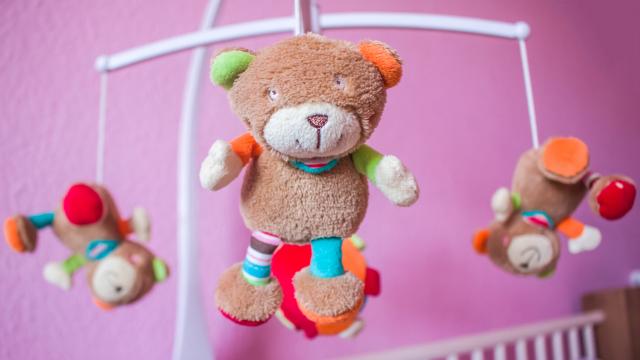I loved singing lullabies to my daughter. As a musical theatre geek who suddenly had a captive audience (one that was physically incapable of walking out on me), how could I not? At nap time, bed time, really any time, I’d croon my own renditions of familiar classics. A couple of standouts: “Don’t Cry For Me Little Baby” (sung to the tune of “Don’t Cry for Me Argentina”) and a song I just referred to as “Baby Hypnosis”.
Photo: Evgenia22 (Getty Images)
For that one, I took the tune of Brahms Lullaby and would sing the words “Go to sleep, little child, you are getting very sleepy. You are getting very sleepy, you will go to sleep right now” over and over and over. Like clockwork, after, say, 27 rounds or so, the kid would finally pass out. Lullabies were my jam.
While singing lullabies to babies is a ritual that has been passed down for generations, it’s been getting some recent attention. Researchers have discovered there’s something special about these short, repetitive songs that little ones (hopefully!) associate with sleep.
According a New York Times piece, lullabies can help infants create neural pathways for calming down, restore a sense of well-being in those who sing them (one study found that singing to babies was associated with fewer symptoms of postpartum depression), and provide an opportunity for parents and babies to bond.
Dr Anita Collins, author of the forthcoming book The Lullaby Effect, tells the Times, “Babies’ auditory processing or hearing sense is actually the most important sense they have for the first two years of their lives, the sense that gathers the most information about their world.”
[referenced url=”https://www.lifehacker.com.au/2018/03/how-to-have-a-conversation-with-a-baby/” thumb=”https://i.kinja-img.com/gawker-media/image/upload/t_ku-large/yqggufoplkiokzrtqdg7.jpg” title=”How To Have A ‘Conversation’ With A Baby ” excerpt=”New parents hear the advice often. You need to talk to your baby! A lot! The book SuperBaby proclaims 30,000 words a day is the magic number for optimal language success. One landmark study found that kids who heard 45 million words by age three later scored the highest in reading and maths. There’s even a wearable word counter that you can clip onto your infant’s onesie and see via an app whether you’re meeting your daily word goals. Basically, a verbal Fitbit.”]
While the most meaningful lullabies are often the ones that you write yourself, not everyone feels completely at ease singing made-up lyrics to a tiny person who’s drooling. It takes a bit of letting go. Here are some tips to help you get started.
Don’t worry if you think you can’t carry a tune. Your baby does not care.
Swap in your own lyrics to familiar songs, and sing about simple, personal topics. The Lullaby Project is an initiative from Carnegie Hall’s Weill Music Institute that helps mothers bond with their babies through lullabies they write themselves.
Singer/songwriter Emily Eagen, a founding member of the project, shares in this video how you can take familiar songs such as “Frère Jaques” and swap in your own lyrics – try singing about your kid’s day or toys or body parts.
Keep the tunes simple. Katarina Juvancic, a Slovenian singer-songwriter and anthropologist, tells the Times that the tunes of folk lullabies are great because they offer “time-tested sedative effects often composed in a five-note pentatonic scale”.
“Drug them” with your voice. Juvancic also adds that you should keep your volume low. “You’re basically drugging them by repeating the same rhythm pattern over and over,” she says.
Don’t stop as your kids grow up. You can sing lullabies to listeners of any age – or species! Pets and the elderly make for excellent audiences. My daughter is five now, and we still sing the “Goodnight Song” to all her friends and favourite stuffed animals. It’s achingly sweet. I’ll remember these moments. I hope she will, too.

Comments